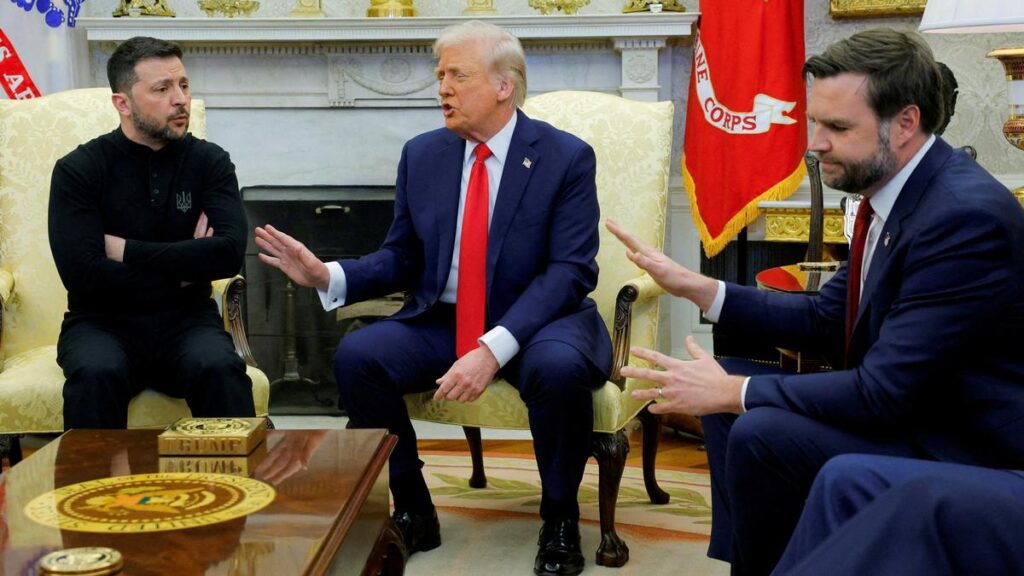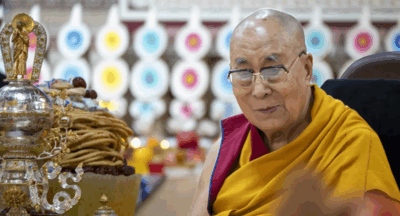By Girish Linganna
Sometimes, history changes little by little, almost imperceptibly. Deep beneath the surface, major forces are at work, slowly shaping the future. But, on the surface, everything seems stable, as if nothing is changing. And, sometimes, it moves very fast, almost like a sudden Nor’wester. Pressure builds up over time, and then, all at once, some event of great magnitude happens—like an earthquake that shakes the ground. In these moments, everything seems to change instantly.
The unusual scene in the Oval Office on Friday February 28 was yet another sign that we are living in times of sudden and significant change.
Yascha Mounk, Founder and Editor-in-Chief of Persuasion and author of The Identity Trap, says he has become cautious about joining platforms for public criticism, even when he agrees with the message and the sentiments behind it. He says that some people are better at repeating popular opinions than he is. From his experience, he has learnt that simply agreeing with the majority mostly just makes those who already believe in something feel confident. However, it does not really help change the minds of people who are unsure or think differently.
It was shameful to see the US government harshly criticizing the leader of a country that is struggling to survive while facing an invasion. Even if someone ignored how US President Donald J Trump was mainly thinking about himself—as when he showed real sympathy for how much he thought Russian President Vladimir Putin had suffered during the Russia investigation—it should be clear that openly disagreeing like this makes it harder to negotiate a peace deal that Ukraine would find acceptable.
It may take years—or even decades—to understand whether Trump and JD. Vance deliberately tried to provoke Volodymyr Zelenskyy, or if their different personalities and views naturally led to a clash. Some people now argue that, for the sake of his country, Zelenskyy should have stayed patient for just 30 more minutes to avoid angering Trump and Vance.
A politician’s strengths and weaknesses are often closely linked, although many people may not realize it. The very qualities that make a leader successful can also create challenges for them. For instance, a confident and decisive politician may be admired for his leadership, but could also be criticized for being stubborn, or unwilling to listen to others.
Similarly, someone who is skilled at building relationships and making compromises may be praised for diplomacy, but could also be seen as indecisive, or overly influenced by others. This way, a politician’s greatest assets can, sometimes, become his biggest drawbacks, depending upon the situation and public perception.
A politician who stays calm and makes decisions based on logic—following what sociologist Max Weber called “ethic of responsibility”—might have been able to prevent this mess. In fact, Keir Starmer did something similar the day before, which helped his country, but came at the cost of his personal pride; he had to set aside his own feelings, ego, or sense of self-respect to do what was best for the nation.
But a leader who always stays calm and logical might not have shown the kind of bold courage that Zelenskyy displayed in February 2022. At that time, he chose to remain in Kyiv, even though the fight against Russia seemed impossible to win and his life was in serious danger. This decision required a different kind of leadership—one where a person does what he believes is right, even if it seems unreasonable, or risky. Sociologist Max Weber described this as the “ethic of ultimate ends”, meaning a leader follows his values and principles, no matter the consequences.
It is clear that Trump is changing the way the US has handled foreign policy since the end of World War II. Instead of following the traditional approach that past leaders have used for decades, he is taking a different path in how the country deals with other nations. Trump’s way of looking at the world is based on two ideas that go against how every US president since 1945 has viewed America’s role globally—even though those past leaders had their own differences. While previous presidents generally followed a common approach in foreign policy, Trump’s perspective challenges that tradition.
Trump sees the world as a competition where one side wins and the other loses. In the past, the US built relationships with such allies as Japan and the United Kingdom based on the idea that both countries could benefit from working together. The US promised to protect its allies, offering them security and defence. In return, America benefited from a stable world, gained advantages from free trade and had a strong influence over global rules and decisions.
However, Trump’s approach is different—he views international partnerships as a game where, if one country gains, the other must lose. He notices that countries in Europe and East Asia—China, Japan and South Korea, for instance—seem happy with their agreements with the US. Because of this, he assumes that America must be getting a bad deal. In his way of thinking, if these other countries are benefiting, the US must be losing, or being treated unfairly.
This is why Trump is so focused on using America’s power over its long-time allies to get as many immediate benefits as he can. Europeans see this as similar to a mafia boss demanding protection money. But Trump, possibly, sees himself as a businessman fixing a bad deal to make it fairer for the US.
The second idea behind Trump’s approach to foreign policy is his belief that powerful countries should have control over certain regions and that this is the normal and, possibly, even the right way for the world to be organized. Past US presidents have believed that every country should have the freedom to decide its own future. They welcomed any nation that supported the US to become an ally, no matter where in the world.
Trump, on the other hand, believes that powerful countries naturally control certain regions and ignoring this reality is a mistake. He thinks that trying to build alliances without considering this is unrealistic, wastes money and is based on emotions rather than smart planning. Trump’s foreign policy focusses on making the most of America’s power in its own region, rather than protecting the independence of such distant places as Ukraine or Taiwan. His priority is to benefit the US directly, rather than getting involved in conflicts far from home.
Panama and Greenland are in a region where the US has strong influence, so, Trump believes this gives him the right to make bold or extreme demands on them. Trump seems to view Ukraine as naturally belonging under Russia’s influence. This would, possibly, explain why he is frustrated when asked to support Ukraine. It is less about his friendly public image with Putin, or any secret deal, and more about how he views global power and influence.
When the world is changing quickly, as it is now, it is easy to notice what is disappearing from the old way of life. However, it is much harder to guess what the new way of life will be like in the future. If Trump has his way, relationships between countries will be more like business deals. America’s usual allies in the western hemisphere will have two choices: either become more independent, or pay the US for protection. Countries that are close to being powerful authoritarian nations, such as China or Russia, will have to adjust and follow their rules to avoid conflict.
But, will this kind of world remain stable? Or will it let a dictator become so powerful that he starts taking over areas controlled by another major country, leading to the very global war that leaders such as Trump say they know how to prevent? Trump might be better at breaking down the old system than building a new one. If the US steps back, China could take its place and reshape the world in a way that suits its own interests, especially outside the western hemisphere.
What would a world led by China (Pax Sinica—a period of peace under China’s influence) look like? Would it be stable? And how would such countries as India, Brazil, or the United Kingdom fit into this new global order?
What will happen to Ukraine in the future? Will the bond between Europe and the US grow weaker? Can Europe find the strength to defend itself? Will Trump’s government let China take control over East Asia? And, if so, what would that mean for Taiwan, Japan and South Korea? What will the future world order look like? These are the important questions being asked. Will powerful countries openly do whatever they want, or will new rules help bring stability and prevent chaos in global affairs? (IPA Service)


 Bathing In Polluted Water Of Ganges For Celestial Gains Negation Of Science
Bathing In Polluted Water Of Ganges For Celestial Gains Negation Of Science 